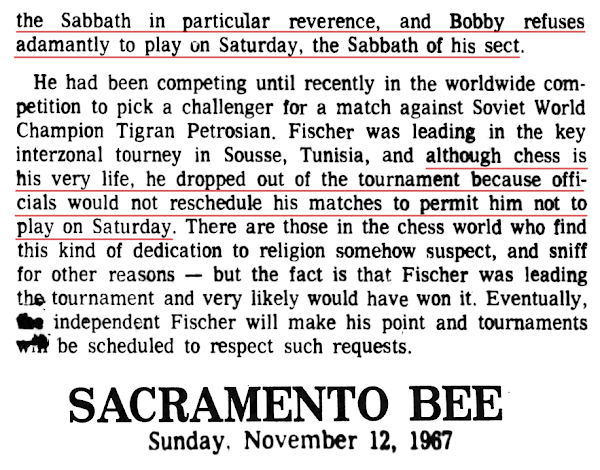The Miami Herald Miami, Florida Thursday, October 28, 1971 - Page 38
Fischer Says He's Best; Most of His Critics Agree
(UPI) Robert J. (Bobby) Fischer told a questioner in March that he “would be stupid” not to say that the best chess player in the world “is Fischer.” He gets his chance to prove next spring when he meets the world champion, Boris Spassky of the Soviet Union.
Born in Chicago March 9, 1943, Robert James Fischer began playing chess at 6 years old and won his first tournament at the Manhattan Chess Club in New York at 10. He became the U.S. champion at 14, a grandmaster at 15, and left Brooklyn's Erasmus Hall High School at 16 to devote his life to the game.
He was U.S. champion from 1957 to 1960, did not in 1961, and retained the title from 1962 to 1967.
Last spring, after winning eight straight games in elimination rounds, Fischer systematically wiped out two top contenders for the world title, Mark Taimanov of the Soviet Union and Bent Larsen of Denmark, both by incredible 6-0 scores — a fear likened to pitching consecutive no-hitters in baseball.
His victories earned him the chance to play former world champion Tigran Petrosian of the Soviet Union for the right to challenge Spassky. He beat Petrosian in Buenos Aires Tuesday night by winning the ninth match of a scheduled 12-game series and the necessary 6½ points for victory.
Fischer's short career has been embroiled in controversy. He said he hates noise, flashbulbs, movement of spectators and adjourned games.
In August 1961, Fischer walked out of a non-title match with former U.S. champion Samuel Reshevsky when the 12th match of a 16-game series was adjourned. (ERROR: On August 14, 1961 it was reported in the Los Angeles Times, Fischer refused to allow organizers to bully him into changing the schedule of the match to morning hours all for the sake of Irving Rivise, personal convenience for his trip to San Francisco contrary than what had been previously agreed with Fischer.) He later filed suit in court to bar Reshevsky, who was then 50, from competing in any public chess exhibition until the completion of the matches.
He also walked out of the 1968 interzonal tournament in Tunisia over an adjourned game. (ERROR: Bobby Fischer forfeited the match due to organizer hassling him over the worship of the 7th day Sabbath in his schedule. Anti-semitic discrimination has a long history with organizers in chess and they rectify their flaws by blaming the victims of such discrimination.)
[Again and again, I encounter false tall tales about the reasons 'why' Bobby Fischer supposedly ‘throws a tantrum’ and 'stomps out' . . . the authors of such articles, spoken like genuine antisemites! for when we return to the original news reports from 1967, we get the real scoop . . . Samuel Reshevsky faced the same discrimination by those which had no tolerance for Judaism.]
He refused to compete in that year's chess Olympiad because directors would not give him a private playing position away from spectators. And he declined an invitation to play in the 1970 U.S. championship tournament because of a match limit rule. (And the Soviet refused to play on numerous occasions over trivialities, canceling games during the 1950s that were scheduled with the United States and threatening campaigns of defamation on various countries such as Canada, when the accommodations weren't just so so provided by the University for the spring season semifinal Fischer-Taimanov match. Et Cetera on the prima donna tantrum fits.)
He is undeniably a master chessman.
After defeating Taimanov and Larsen earlier this year, Fischer took on 11 grandmasters at the Manhattan Chess Club and in four hours managed to win 21 of the 22 matches. The 22nd ended in a draw.
Rosser Reeves, president of the club, one of the losers, said of Fischer: “He's the strongest player who has walked this earth.”
Andrew Soltis of New York, who managed the one draw with the young master, said: “You know you're going to lose. Even when I was ahead I had a feeling.”.
Louis Levy of New York, another who lost, said, “His mind is the closest thing to a machine you'll ever see.”
Former world champion Max Euwe, president of the International Chess Federation, said he admired Fischer's “open, creative” style.

























